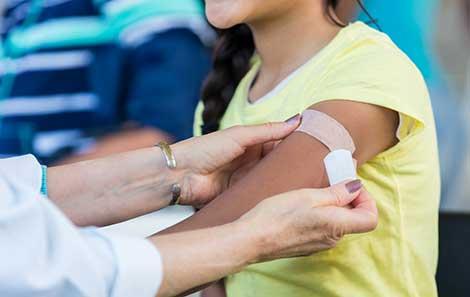Cervical Cancer Types & HPV Infections
Make an Appointment
For the Charlottesville area:
For Manassas or Haymarket:
Call
You're not alone if you're worried about cervical cancer. It's a very common type of cancer. The good news is that it's treatable and preventable. There are two ways you can protect yourself from cervical cancer:
- Getting regular Pap tests
- Getting a vaccine to prevent HPV infections, the main cause of cervical cancer
At UVA Health, you'll find gynecologic cancer doctors who are experts in treating all types of cervical cancers.
Cervical Cancer Types
Cervical cancer starts in the cells of your cervix. The cervix connects the uterus to the vagina. Two main types of cells cover the cervix:
- Squamous cells
- Glandular cells
The type of cervical cancer you have depends on the type of cell with cancer. Under a microscope, we can see the different cell and cancer types.
Cervical Cancer in Squamous Cells
Up to 9 out of 10 cervical cancers develop from squamous cells. They become squamous cell carcinomas.
Cervical Cancer in Gland Cells
Most other cervical cancers are adenocarcinomas. Adenocarcinomas form out of gland cells. Cervical adenocarcinomas seem to have become more common in the past 20 to 30 years.
Some cervical cancers have features of both squamous cell carcinomas and adenocarcinomas. We call these adenosquamous carcinomas or mixed carcinomas.
Other types of cancer can develop in the cervix. But melanoma, sarcoma, and lymphoma more often happen in other parts of the body.
Treating Pre-Cancer Cells
Only some women with pre-cancers of the cervix will develop cancer.
For most women, pre-cancerous cells go away without treatment.
In some women, pre-cancers turn into cancer. This can happen in less than a year. But it usually takes several years.
Treating all cervical pre-cancers can prevent almost all cervical cancer.
Get Screened for Cervical Cancer
A Pap test/smear looks for HPV and pre-cancers. But you have other options for cervical cancer screening.
HPV Vaccine Protects Against Cancer
A human papillomavirus (HPV) infection is the biggest risk factor for all cervical cancer types. Many people have HPV. Most of the time, the body clears the infection by itself. But some HPV infections can become chronic and lead to cancer.
HPV is a group of more than 150 related viruses. They spread from one person to another through skin-to-skin contact. HPV can also spread through sexual activity.
Some types of HPV cause warts on different parts of the body. These tend to not cause cancer.
Other types of HPV do cause types of cervical cancer and lots of other cancers, including:
The HPV vaccine is almost 100% effective at preventing the types of HPV that cause all these cancers. The HPV vaccine is available for children and adults. Talk to your primary care provider today.
Cervical Cancer Treatment
Treatment aims to remove as much of the cancer as possible. We also try to preserve your cervix and its function. Your treatment plan will often include a combination of approaches. We'll customize the plan based on your age, general health, and prognosis.
Find out about the many options at UVA for cervical cancer treatment.

HPV Vaccine
HPV can be spread through any kind of touch. Most people get it at some point in their lives. The HPV vaccine makes sure your child doesn't get infected. This step can prevent cancer.